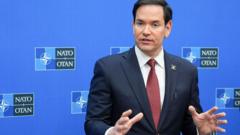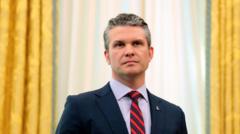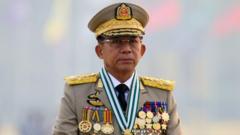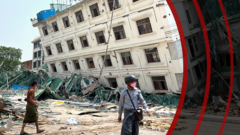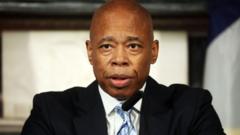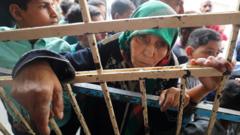Critics say US response to Myanmar earthquake is hindered by funding cuts; Rubio argues other nations must contribute.
US Officials Defend Handling of Myanmar Earthquake Response Amid Criticism
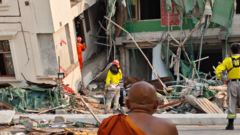
US Officials Defend Handling of Myanmar Earthquake Response Amid Criticism
Secretary of State Rubio Addresses Concerns Over Humanitarian Aid Shortcomings
US Secretary of State Marco Rubio has addressed growing criticism regarding the United States' response to the devastating earthquake in Myanmar, asserting that the country cannot be expected to shoulder the entire burden of global humanitarian efforts. During a recent interview, he deflected claims that the lack of a robust American response was due to the dismantling of the United States Agency for International Development (USAID) under the Trump administration. Rubio stated, "We are not the government of the world," emphasizing that the US must balance its humanitarian commitments with its national interests.
This response comes on the heels of the powerful 7.7 magnitude earthquake that struck Myanmar on March 28, resulting in the tragic death of over 3,000 individuals and leaving thousands more injured or missing. In the wake of the disaster, former USAID officials argued that the agency's downsizing has hampered the US's ability to deploy rescue teams and resources swiftly. Rubio acknowledged the challenges posed by the military junta currently governing Myanmar, which complicates international aid efforts, while also confirming that the US administration would still seek to provide assistance within those constraints.
The urgency of the situation reportedly led the White House to attempt deploying a Disaster Assistance Response Team (DART) to the region; however, logistical challenges, compounded by previous funding cuts under the Trump administration, hindered this effort. In light of criticisms directed at the US humanitarian response, Rubio maintained that other wealthy nations, including China and India, should contribute to the crisis relief as well. He remarked on the necessity of collaboration among nations when responding to such disasters, reiterating that the United States will contribute where possible, but global efforts must be collective.
Furthermore, he expressed a commitment to collaborate with appropriate non-governmental organizations that can effectively deliver aid, distancing the US from the previous model of extensive funding to large NGOs. Rubio argued that the US should no longer finance organizations that benefit disproportionately from taxpayer money, emphasizing a shift towards a more efficient and responsible approach to international aid.
This response comes on the heels of the powerful 7.7 magnitude earthquake that struck Myanmar on March 28, resulting in the tragic death of over 3,000 individuals and leaving thousands more injured or missing. In the wake of the disaster, former USAID officials argued that the agency's downsizing has hampered the US's ability to deploy rescue teams and resources swiftly. Rubio acknowledged the challenges posed by the military junta currently governing Myanmar, which complicates international aid efforts, while also confirming that the US administration would still seek to provide assistance within those constraints.
The urgency of the situation reportedly led the White House to attempt deploying a Disaster Assistance Response Team (DART) to the region; however, logistical challenges, compounded by previous funding cuts under the Trump administration, hindered this effort. In light of criticisms directed at the US humanitarian response, Rubio maintained that other wealthy nations, including China and India, should contribute to the crisis relief as well. He remarked on the necessity of collaboration among nations when responding to such disasters, reiterating that the United States will contribute where possible, but global efforts must be collective.
Furthermore, he expressed a commitment to collaborate with appropriate non-governmental organizations that can effectively deliver aid, distancing the US from the previous model of extensive funding to large NGOs. Rubio argued that the US should no longer finance organizations that benefit disproportionately from taxpayer money, emphasizing a shift towards a more efficient and responsible approach to international aid.

